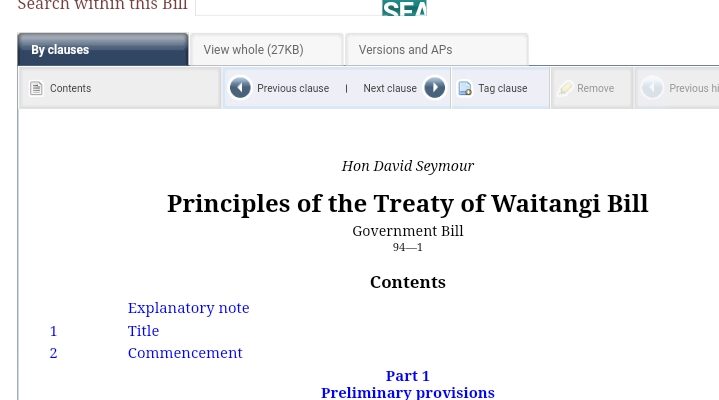The first thing which struck me is how good Te Pāti Māori’s Hana-Rawhiti Maipi-Clarke voice is!
Her’s are not my politics: I’m all for the conversation ACT’s Treaty Principles Bill has started.
The modern set of Treaty of Waitangi’s principles have been developed by courts since 1975’s and have been accepted by successive executive branches of government all along their modern 40 year journey.
The only executive that has said no to the Court’s judicial interpretations was Helen Clark’s government over the foreshore and sea bed decisions. Helen explicitly legislated to overwrite that legal direction, and that government’s actions led to the creation of the Māori Party.
But pretty much every other government has said, “yeah alright” to every direction the courts have steered Maori/Crown relations.
Courts make law
You might think that courts interpret law. But they also make law.
Every time a case comes before the courts the courts are obliged to make a decision for one of the parties over the other. That’s the deal with our adversial system: someone loses, someone wins.
Those decisions set precedent – future courts follow the law and interpretations of preceding decisions on the same topic.
Through a range of precedent setting decisions, the courts have created a series of Treaty of Waitangi principles.
I learnt Public Law in 1991 – I’m not even going to pretend my knowledge of current Treaty principles is up to date.
I refer the reader to my esteemed learned colleague, Wikipedia.
The Crown is a legal fiction
Ever since the English civil war, the “Crown” is the entity that assents to laws created by parliament.
Parliament is sovereign, and it took Oliver Cromwell to slap King Charles II around a bit back in 1642 before Charles got shown the door and Big Dog Olly C becoming England’s Lord Protector for a time during the inter-regnum.
Prior to the English Civil War, the Crown – the physical person who is King or Queen – was sovereign and made laws. And set taxes. And punished any one they chose. They were an absolute monarchy.
The same absolute power trick also happened in France, much to Louis the 16th misfortune when the French revolted and he and a truckload of others lost their heads.
Back to England
When the Crown was reestablished under William of Orange, Little Willy got with the programme and started taking his advice from Parliament.
Moving into Modern New Zealand
The Crown, in New Zealand, is represented by Her Excellency The Right Honourable Dame Cindy Kiro, acting on behalf of His Majesty King Charles III, King of New Zealand. Dame Kiro assents to laws that have passed the third reading by Parliament, also known as the House of Representatives.
Because everything has multiple names, the Crown is also known as the Executive branch of Government, and it acts on the advice of its ministers operating through the Executive’s Privy Council.
Operationally, the Executive (the Crown) is comprised of the Ministers of the Crown. The Executive’s Privy Council, is more familiarily called Cabinet. Cabinet decisions are Crown decisions.
So, when the Crown loses court cases because the Courts have declared a “new treaty principle”, that outcome is the courts making new pieces of social policy. And those declared principles are never discussed with the New Zealand public before the decision, or are policies that are put to them for a vote.
The government who doesn’t challenge the court’s decision accepts whatever political bias underlays that decision, regardless of where the elected government’s politics may lay.
Political change is costly
I’m sure some of the court’s decisions must piss off the government of the day immensely. But overriding a decision through legislation consumes political capital and is not “costless” to a government in power.
Sometimes it’s easier to pick your political fights than fight individual decisions which incrementally sum up into quite significant policy change.
So a handful of unelected judicial officers have gotten to determine big chunks of New Zealand’s social policy without pretty much all of New Zealand having a say whether they think whatever was decided was a good decision or not.
Court’s aren’t staying within their swim lanes
The situation gets worse when judges take it on themselves to venture outside their swim lane and move beyond legislative interpretation into advocacy around their own personal political views and creating new law, like they’ve done with the Treaty.
ACT knows this bill will not even come close to succeeding. But having come this far, ACT has raised the issue into the public’s focus and made these policy conversations explicit.
And now, everyone gets a chance to have their say on the bill through select committee. They are entitled to say whether they agree with where the courts have steered the principles debate, if they believe so.
But I think, my dear New Zealand, that the boldness of character to have this conversation is worth defending.
Good on you David Seymour.


